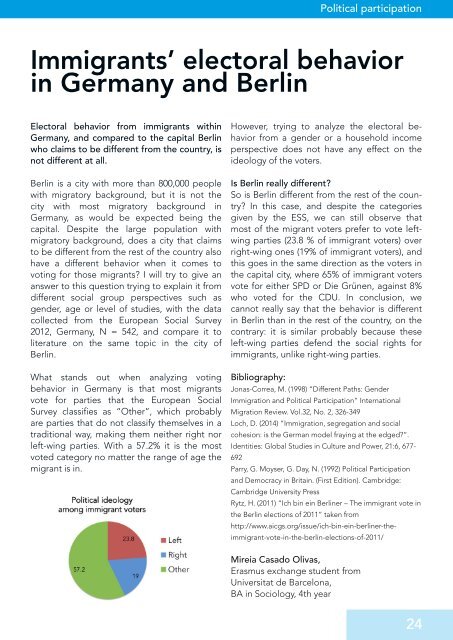Immigration in Berlin
A collection of scientifically-inspired articles written by the students of the course Immigration in Electoral Democracies at the Humboldt - Universität zu Berlin (Summer Semester 2015)
A collection of scientifically-inspired articles written by the students of the course Immigration in Electoral Democracies at the Humboldt - Universität zu Berlin (Summer Semester 2015)
You also want an ePaper? Increase the reach of your titles
YUMPU automatically turns print PDFs into web optimized ePapers that Google loves.
Political participation<br />
Immigrants’ electoral behavior<br />
<strong>in</strong> Germany and Berl<strong>in</strong><br />
Electoral behavior from immigrants with<strong>in</strong><br />
Germany, and compared to the capital Berl<strong>in</strong><br />
who claims to be different from the country, is<br />
not different at all.<br />
Berl<strong>in</strong> is a city with more than 800,000 people<br />
with migratory background, but it is not the<br />
city with most migratory background <strong>in</strong><br />
Germany, as would be expected be<strong>in</strong>g the<br />
capital. Despite the large population with<br />
migratory background, does a city that claims<br />
to be different from the rest of the country also<br />
have a different behavior when it comes to<br />
vot<strong>in</strong>g for those migrants? I will try to give an<br />
answer to this question try<strong>in</strong>g to expla<strong>in</strong> it from<br />
different social group perspectives such as<br />
gender, age or level of studies, with the data<br />
collected from the European Social Survey<br />
201 2, Germany, N = 542, and compare it to<br />
literature on the same topic <strong>in</strong> the city of<br />
Berl<strong>in</strong>.<br />
What stands out when analyz<strong>in</strong>g vot<strong>in</strong>g<br />
behavior <strong>in</strong> Germany is that most migrants<br />
vote for parties that the European Social<br />
Survey classifies as “Other”, which probably<br />
are parties that do not classify themselves <strong>in</strong> a<br />
traditional way, mak<strong>in</strong>g them neither right nor<br />
left-w<strong>in</strong>g parties. With a 57.2% it is the most<br />
voted category no matter the range of age the<br />
migrant is <strong>in</strong>.<br />
However, try<strong>in</strong>g to analyze the electoral behavior<br />
from a gender or a household <strong>in</strong>come<br />
perspective does not have any effect on the<br />
ideology of the voters.<br />
Is Berl<strong>in</strong> really different?<br />
So is Berl<strong>in</strong> different from the rest of the country?<br />
In this case, and despite the categories<br />
given by the ESS, we can still observe that<br />
most of the migrant voters prefer to vote leftw<strong>in</strong>g<br />
parties (23.8 % of immigrant voters) over<br />
right-w<strong>in</strong>g ones (1 9% of immigrant voters), and<br />
this goes <strong>in</strong> the same direction as the voters <strong>in</strong><br />
the capital city, where 65% of immigrant voters<br />
vote for either SPD or Die Grünen, aga<strong>in</strong>st 8%<br />
who voted for the CDU. In conclusion, we<br />
cannot really say that the behavior is different<br />
<strong>in</strong> Berl<strong>in</strong> than <strong>in</strong> the rest of the country, on the<br />
contrary: it is similar probably because these<br />
left-w<strong>in</strong>g parties defend the social rights for<br />
immigrants, unlike right-w<strong>in</strong>g parties.<br />
Bibliography:<br />
Jonas-Correa, M. (1 998) “Different Paths: Gender<br />
<strong>Immigration</strong> and Political Participation” International<br />
Migration Review. Vol.32, No. 2, 326-349<br />
Loch, D. (201 4) “<strong>Immigration</strong>, segregation and social<br />
cohesion: is the German model fray<strong>in</strong>g at the edged?”.<br />
Identities: Global Studies <strong>in</strong> Culture and Power, 21 :6, 677-<br />
692<br />
Parry, G. Moyser, G. Day, N. (1 992) Political Participation<br />
and Democracy <strong>in</strong> Brita<strong>in</strong>. (First Edition). Cambridge:<br />
Cambridge University Press<br />
Rytz, H. (201 1 ) “Ich b<strong>in</strong> e<strong>in</strong> Berl<strong>in</strong>er – The immigrant vote <strong>in</strong><br />
the Berl<strong>in</strong> elections of 201 1 ” taken from<br />
http://www.aicgs.org/issue/ich-b<strong>in</strong>-e<strong>in</strong>-berl<strong>in</strong>er-theimmigrant-vote-<strong>in</strong>-the-berl<strong>in</strong>-elections-of-201<br />
1 /<br />
Mireia Casado Olivas,<br />
Erasmus exchange student from<br />
Universitat de Barcelona,<br />
BA <strong>in</strong> Sociology, 4th year<br />
24


